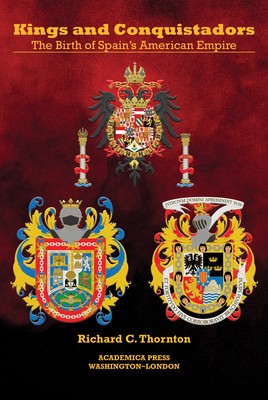
- We will send in 10–14 business days.
- Author: Richard C Thornton
- Publisher: Academica Press
- ISBN-10: 1680539124
- ISBN-13: 9781680539127
- Format: 15.2 x 22.9 x 2.2 cm, minkšti viršeliai
- Language: English
- SAVE -10% with code: EXTRA
Reviews
Description
Spain's American empire began as the serendipitous outgrowth of the search for a shortcut to China. That search derived from two mid-fifteenth-century developments: the Ming Dynasty's decision to adopt a silver standard for its medium of exchange and the Ottoman Turks' capture of Constantinople in 1453. China's great demand for silver and the disruption of the Silk Road drove the need to find alternative access to China. King John II of Portugal sent explorers southward along the coast of Africa and thence to the Orient, but Ferdinand and Isabella sent Christopher Columbus westward, believing he would find a shorter route.
A persistent if disorderly push by Spanish conquistadors led to the discovery of previously unknown civilizations, including the empires of the Aztecs and the Incas. The search for a short-cut to China became bound up with the seizure of the riches held by native populations. Although the conquistadors were vastly outnumbered, their superior technology-steel swords, armor, war horses, and firearms-concomitant with diseases that accompanied them, enabled them to subdue native American peoples and confiscate their wealth.
The aftermath was fraught with complications and strife. Crown- appointed governors came into conflict with the conquistadors. Distances were great, and the governors tended to place their interests over those of the King. Cortez conquered the Aztecs despite the governor's attempts to prevent his campaign. Bureaucratic interference bedeviled Francisco Pizzaro's campaign against the Incas, which, nonetheless, contributed more to the wealth of his country than any other conquistador's exploits. Ultimately, the vast wealth of the Americas would fuel Spain and its Empire for nearly two centuries.
EXTRA 10 % discount with code: EXTRA
The promotion ends in 22d.01:18:00
The discount code is valid when purchasing from 10 €. Discounts do not stack.
- Author: Richard C Thornton
- Publisher: Academica Press
- ISBN-10: 1680539124
- ISBN-13: 9781680539127
- Format: 15.2 x 22.9 x 2.2 cm, minkšti viršeliai
- Language: English English
Spain's American empire began as the serendipitous outgrowth of the search for a shortcut to China. That search derived from two mid-fifteenth-century developments: the Ming Dynasty's decision to adopt a silver standard for its medium of exchange and the Ottoman Turks' capture of Constantinople in 1453. China's great demand for silver and the disruption of the Silk Road drove the need to find alternative access to China. King John II of Portugal sent explorers southward along the coast of Africa and thence to the Orient, but Ferdinand and Isabella sent Christopher Columbus westward, believing he would find a shorter route.
A persistent if disorderly push by Spanish conquistadors led to the discovery of previously unknown civilizations, including the empires of the Aztecs and the Incas. The search for a short-cut to China became bound up with the seizure of the riches held by native populations. Although the conquistadors were vastly outnumbered, their superior technology-steel swords, armor, war horses, and firearms-concomitant with diseases that accompanied them, enabled them to subdue native American peoples and confiscate their wealth.
The aftermath was fraught with complications and strife. Crown- appointed governors came into conflict with the conquistadors. Distances were great, and the governors tended to place their interests over those of the King. Cortez conquered the Aztecs despite the governor's attempts to prevent his campaign. Bureaucratic interference bedeviled Francisco Pizzaro's campaign against the Incas, which, nonetheless, contributed more to the wealth of his country than any other conquistador's exploits. Ultimately, the vast wealth of the Americas would fuel Spain and its Empire for nearly two centuries.


Reviews